

English, School of. English, School of Key measures: Positive Outcomes: 92%, Graduate prospects: 75.2%, Graduate employment: 75.5% Graduate destinations: Work Full-time: 61%, Work Part-time: 10%, Work & Study: 3%, Further study: 20%, Unemployed: 7% Top industry sectors: Advertising, Marketing & Public Relations; Education; Event Management, Leisure, Hospitality & Tourism; Administration; Buying, Selling & Retail Salary levels: Under £10,000: 12%, £10,000-£19,999: 64%, £20,000-£29,999: 24%, £30,000-£39,999: 0%, Over £40,000: 0% The Leeds Network We have an extensive network of alumni with a wide range of experiences, doing all kinds of jobs.
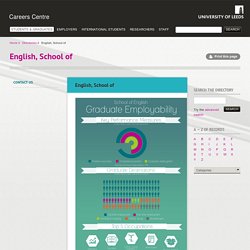
Websites and downloadable resources. Downloads. English degree career options. While they may worry that their degree will be seen as a vague choice, in practice it will have given them a broad understanding of how to interpret texts that is potentially valuable in the careers market.
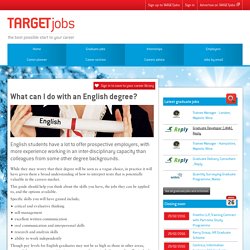
This guide should help you think about the skills you have, the jobs they can be applied to, and the options available. Specific skills you will have gained include; critical and evaluative thinking self-management excellent written communication oral communication and interpersonal skills research and analysis skills ability to work independently Though pay levels for English graduates may not be as high as those in other areas, many of the career opportunities it opens up can be particularly rewarding.
Typical roles include publishing, academia or working with heritage and culture. English graduates are suitable for many roles in the business sector, where they will be able to use their analytical and articulate thinking. What can I do with an English degree? The skills you gain through studying an English degree are marketable in most career areas.
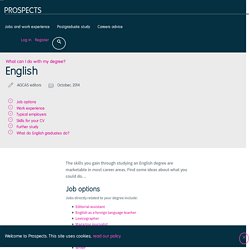
Find some ideas about what you could do… Job options Jobs directly related to your degree include: Jobs where your degree would be useful include: Remember that many employers accept applications from graduates with any degree subject, so don't restrict your thinking to the jobs listed here. Work experience As English is a non-vocational course, the skills developed outside your study are also vital in developing a well-rounded CV. Search for placements and find out more about work experience and internships. Typical employers.
What can I do with an English degree? Skills Your head might be crammed full of useful (and some not-so-useful) information, but your English degree will also help you to develop a wealth of useful skills… Analytical Skills You’re better than Shearer and Hansen put together.

You’re even better than Gary Neville. Fortunately, your top-notch analytical skills also extend beyond the world of football punditry. Attention to Detail You can spot a needle in a haystack. Communication (Oral) All mouth, no trousers? Communication (Written) You may not be a romantic poet, but you can write in a professional, succinct and appealing fashion. Creativity You have the ability to come up with creative and innovative ideas. Rewarding-jobs-for-maths-grads-2. What can I do with my degree in English Literature? - Careers and Employability Service. Every year the University of Kent participates in the Destinations of Leavers from Higher Education survey to find out what graduates are doing after finishing their courses.
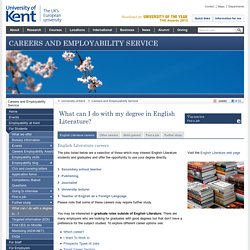
You can access this information here [22]. Please note that this webpage is password protected and only accessible by University of Kent staff and students. The examples shown reflect the destinations of students six months after graduation. Keep in mind that at this early stage some graduates may not have made long-term career choices or entered a graduate-level job role. You will find many examples of graduates who have entered graduate schemes and professional careers, but there may also be some graduates working in temporary employment or taking time out to volunteer, travel or gain appropriate work experience.
The data is collected by UK universities and submitted to the Higher Education Statistics Agency (HESA), which publishes summary reports for all UK Higher Education Institutions. After English - Thinking about your future as an English graduate. English - using your degree - CareersWiki. From CareersWiki Introduction A degree from Scotland's first university is an excellent start to any future career.
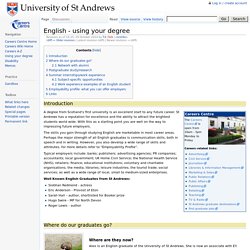
St Andrews has a reputation for excellence and the ability to attract the brightest students world wide. With this as a starting point you are well on the way to impressing future employers. The skills you gain through studying English are marketable in most career areas. Typical employers include: banks; publishers; advertising agencies; PR companies; accountants; local government; UK Home Civil Service; the National Health Service (NHS); retailers; finance; educational institutions; voluntary and charitable organisations; the media; libraries; leisure industries; the tourist trade; social services; as well as a wide range of local, small to medium-sized enterprises.
Joint_honours. English. Downloads. FamousEnglishGraduates. Welcome to the English Association — University of Leicester. The Poetry Society – Connecting you to the transformative power of poetry.